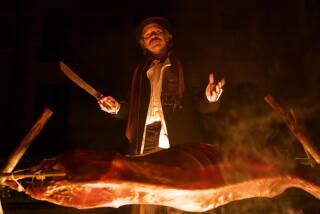America shaped by war and a flu
- Share via
THE year is 1918. The boys are off to the trenches of Belgium and France and super-patriots are barking at home. Get your war bonds! Stop the march of the baby-killing Huns! There’s fear and paranoia in the air, not just of foreign spies and saboteurs, but of a killer no one can see. Spanish influenza lands in Boston and spreads along the East Coast, then races westward across the country, leaving five times as many people dead in its wake as Americans fallen on the battlefields of Europe.
Word traveled much more slowly in 1918 than it does now, of course. In Thomas Mullen’s debut novel, “The Last Town on Earth,” the black clouds are settling on Commonwealth, a booming mill settlement on the far edge of the Pacific Northwest wilderness.
This 2-year-old town 50 miles northeast of Seattle was built on progressive, socialist ideals by workers fleeing the oppressive exploitation of other mills or their own oppressive or dissolute pasts. Most fighting-age men have deferments, due to their critical wartime employment as mill workers, but most don’t see the war in Europe as their fight. To them, America only got in to protect the banks that wouldn’t be able to recoup their loans to France and Britain if Germany wins.
Mullen provides a rich historical background and a well-drawn cast of characters centered on Philip Worthy, the adopted son of Commonwealth founder Charles Worthy and his activist wife, Rebecca. Philip had lost his mother and a foot in an earlier accident, leaving him only able to work in the mill office. His best friend, Graham, just a few years older than Philip, is a sturdy man bound on protecting his family and his little piece of paradise. For Graham, the world beyond Commonwealth had betrayed him by taking away his first love, a woman killed in the battle between striking mill workers and hired thugs in the infamous riots of Everett, Wash., a few years earlier.
Mullen opens his tale in Timber Falls, the closest settlement to Commonwealth, with a doctor and nurse seeing for themselves the dead and dying in a home hit by the Spanish flu. Commonwealth decides to fight the disease by imposing a quarantine, not allowing anyone to enter or leave the town until the outbreak has passed. The men sign up for duty at guard posts on the outskirts of town. Philip and Graham are the first to confront someone trying to enter Commonwealth, an apparently wounded soldier seeking food and shelter. Without giving away much of the story, this sets off a series of events that challenge everything the idyllic mill town and its people stand for. There are really two plagues facing Commonwealth in this novel: the very real influenza and the imagined ultranationalism of those who took the country to war. Both have tragic consequences, though one is avoidable.
Mullen shows how World War I and the Spanish flu changed the face of America irrevocably. Before America entered the conflict, the country, like Commonwealth, had been largely isolated from Europe, and the rest of the world for that matter. No quarantine could hold off what was to come.
The novel also gives us a glimpse of the socialist and progressive communities that were popping up around the country, anarchic cooperatives of like-minded workers or individualistic religious communities in the wilds of the West where the federal and state governments had yet to secure power. They too would disappear with America’s entrance into WWI and the deadly ramifications of these plagues.
Mullen has written a fascinating account of a time and a place that most of us have never heard about, all without going overboard in sentimentality or kitsch.
*
Michael Standaert is the author of “Skipping Towards Armageddon: The Politics and Propaganda of the Left Behind Novels and the LaHaye Empire.”
More to Read
Sign up for our Book Club newsletter
Get the latest news, events and more from the Los Angeles Times Book Club, and help us get L.A. reading and talking.
You may occasionally receive promotional content from the Los Angeles Times.






